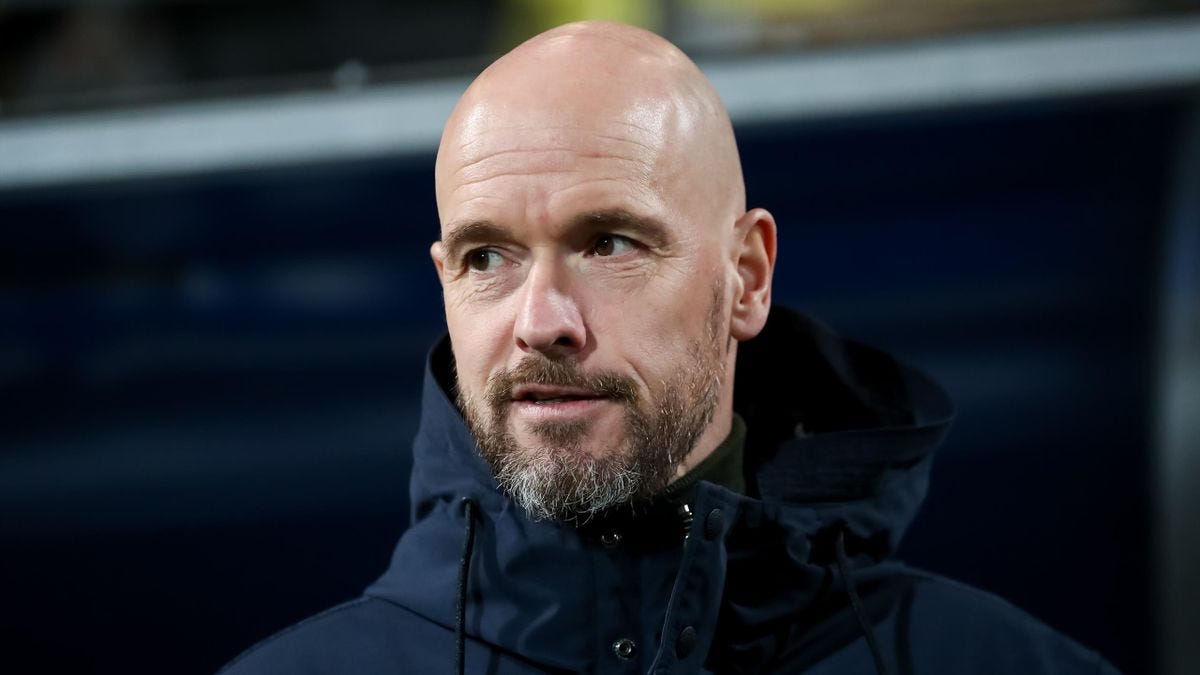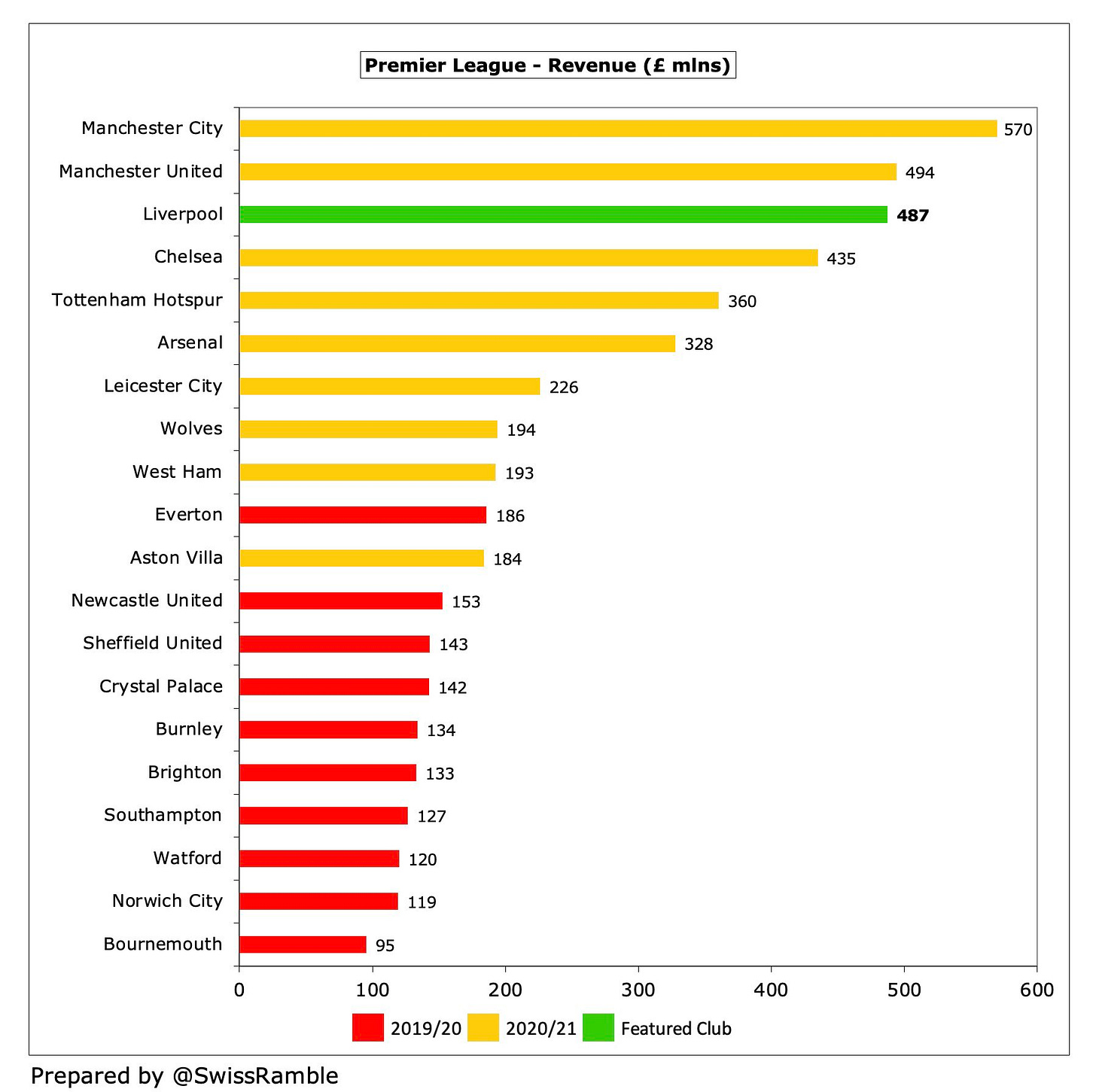Looking for Erik
What do Manchester United even want from Ten Hag?
Comparing Manchester United to Liverpool in the 1990s has been done to death, but indulge me for a moment.
After Graeme Souness’ attempts at reinvigorating Liverpool totally failed, Roy Evans took over in his place. Evans was a graduate of the famous “boot room” that saw the club right for the past thirty years of sustained success. He tried to get Liverpool back to the old fashioned values that had served the club so well, but it was no use. The game had changed. Yes, Evans’ Liverpool played exciting football and produced some enjoyable memories, but they never came close to reaching the standards set by Alex Ferguson’s Man Utd.
There were major mistakes in the transfer market led by an obvious lack of joined-up thinking, notably the English record-breaking deal for Stan Collymore. “I don’t know of any other industry that would lay out £8.5 million on anything and not have some plan from day one on how they’re going to use it”, Collymore claimed. “I remember in the first four or five weeks thinking, ‘This is bollocks. They’ve broken the British transfer record to sign me without any plan of how to to use me properly’”.
It’s obvious Collymore felt Liverpool were well behind the times in every regard, certainly compared to his former club Nottingham Forest. “There was a guy in the canteen doling out thick slices of toast, putting on butter with a spatula. Razor [Ruddock] would have a couple of slices with bacon. ‘Do you want a fried egg with that, Razor?’. The fitness training was non-existent. I would rate Forest’s preparation for Premier League football at that time at 9.9 out of 10. Liverpool was a five. At Liverpool, I was as unfit as I’d been for two or three years.”
Liverpool were poor in terms of attitude with the infamous “spice boys” generation. They were poor with recruitment, tactics and fitness. The methods that had brought such success in the 1970s and 80s were both poorly executed and outmoded anyway by other clubs. Everything had to change.
So that’s exactly what Gérard Houllier did. If Evans’ players were having too much fun both on and off the pitch, Houllier’s side would be the exact opposite. “We changed the habits in terms of the way the team prepared and practised. We brought a different attitude to training, demanding that the players looked after themselves in terms of diet” he explained. “I personally think we also signed a group of players that went on to play together for a long time: players from different countries, different leagues and different attitudes – probably more in tune with what was happening elsewhere in football. This is not a criticism of what happened previously.
“But sometimes you need to change to evolve.”1
Houllier’s transformed Liverpool had a lot of virtues. They were organised and tough to beat with resilient football. This made them particularly suited to cup competitions, winning the UEFA Cup (now the Europa League) along with an FA Cup and two League Cups. But of course, as I’m sure you all know, Liverpool did not win the Premier League title under Houllier. It would be another 20 years before that happens.
The team had plenty of virtues, certainly in terms of organisation, but lacked a little bit of stardust and quality in the final third to really push on and win major honours. This was the case because financial realities were starting to hit. Liverpool were the biggest and richest club in England at the start of the 90s, but a decade of underperformance and wasted money led to other clubs not just catching up but actively taking over.
Everyone knows that Man Utd have massively underperformed on the pitch since Ferguson retired. I think what’s less well known is that they haven’t exactly been smashing it on the financial front, either. Eyebrows were raised when Manchester City announced they had overtaken their rivals United in terms of revenue. I’m not here to argue about the legitimacy of City’s finances, though that club isn’t going away. But what flew under the radar a little is that Liverpool have now all but caught up with United as well.
Outgoing chief executive Ed Woodward famously said “playing performance doesn't really have a meaningful impact on what we can do on the commercial side of the business”. Many viewed this as proof that the club don’t care about results. But the numbers tell a different story. United’s commercial revenue hasn’t risen for years, while their more successful rivals on the pitch keep growing.
Brands don’t want to be associated with losers. Whatever Woodward might say, the best way to grow the commercial side is to win trophies. If he or the Glazers were half as good at business as they like to claim, the above graph doesn’t happen.
That’s the context Erik ten Hag will be working in, assuming the reports about his appointment are correct. Contrary to what many fans and pundits are saying, United cannot simply keep trying to spend their way out of trouble forever. Liverpool broke the British transfer record to sign Collymore without a clue how to use him in 1995, then United did the same thing with Paul Pogba 21 years later. Now they’re going to have to do it the smart way against intelligent opponents with similar or greater resources.
It has been claimed that Ten Hag told United he sees the job as a five-year project, which would suggest an aim to win the Premier League title in 2027. Whatever happens, you can bet that very few members of the current squad will be at the club by then. If this is the path they’re taking, don’t worry too much about the players’ fit. It’ll all have to change anyway, and being proactive about this can at least help them buy in a more focused way. If United are serious about this, it means no more big-name buys for their marketing value. There shouldn’t be a single player coming in who does not clearly fit into Ten Hag’s framework.
That means everyone must be on the same page. I’d feel better about this if they had a director of football with similar ideas. As it is, they have John Murtough as “football director” (is that different from “director of football”? Who can say) and Darren Fletcher as “technical director”. They have a “director of football negotiations”, a “director of football operations” and a “strategy manager”. I hope this makes at least some sense internally, and they’re not simply creating layers of bureaucracy without a clear hierarchy. Ten Hag will bring his own ideas as well, and they need to figure out a way to get all of these people and their different departments working towards the same aim.
That aim might not be popular. All Man Utd managers since 2013 have been defined by Ferguson. David Moyes didn’t have his predecessor’s deft touch in controlling all aspects of the football club. Louis van Gaal didn’t play Ferguson’s more swashbuckling style of football. José Mourinho couldn’t play the statesman the way Ferguson could. Ole Gunnar Solskjær wanted to be Ferguson but never felt like more than a boy dressing up as the old maestro. It is Sir Alex against which they are all judged, and which none can dream of coming close to.
Ten Hag is there to break that mould. He’s not going to play Ferguson’s football and nor is he going to run the whole club in that way. United seem to believe the messiah is going to come along and take the club back to the top alone, and it just isn’t happening. Ten Hag is the most important piece in modernising the club and actually de-emphasising the role of the manager in the long term. Put it this way: if whoever eventually succeeds him isn’t treated as an era-defining appointment, Ten Hag will have been a success.
People will obviously say he’s not of the same calibre as Jürgen Klopp or Pep Guardiola, and that could well be true. But I have two main counterpoints. The first is that neither might be in the Premier League by 2027. You don’t have to outrun the bear. You only have to outrun the other man.
More importantly, United have to get everything around the manager right before being in that league. Neither Klopp nor Guardiola would have won the Premier League at Man Utd these past five years. The structure of the club has to be modernised properly. Everyone is pulling in the same direction at those other clubs. Ten Hag has to be the most important cog in the machine, but he can’t be the machine itself. We’ve seen how trying to do that turns out.
If Manchester United want to avoid a 30-year wait for the Premier League title, it’s time to get over Sir Alex Ferguson. Hiring Ten Hag would be a start.
Further reading
Adding thoughts on Ten Hag’s tactical setup would add another thousand words to this, so I’ll just link to some things I found interesting there. Suwaid Fazal wrote about it at The Busby Babe, concluding that the Dutchman makes expert use of off-ball runs in particular. And it’s paywalled, but I found Nathan A. Clark’s lengthy video on Ten Hag to be an invaluable resource.
Hughes, Simon (2016). Ring of Fire: Liverpool into the 21st century: The Players' Stories. Great Britain: Bantam Press.




